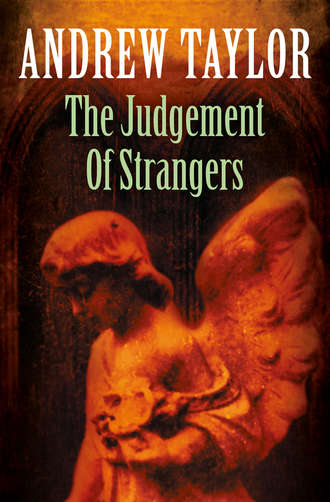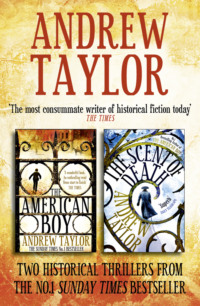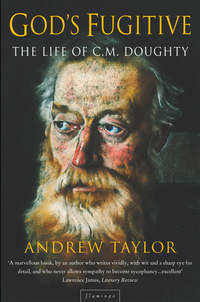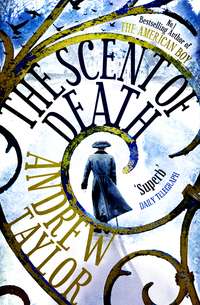
Полная версия
The Judgement of Strangers
‘Do you visit many churches?’ I asked, to make conversation. ‘You mentioned our panel paintings on Friday.’
Vanessa fiddled with one of the crumbs on her plate. ‘Not really. I wanted to see Roth because of the connection with Francis Youlgreave.’
‘The poet?’ My voice sounded unnaturally loud. ‘He’s buried in the vault under the chancel.’
‘He deserves a few paragraphs in here.’ Vanessa tapped the envelope containing the typescript. ‘Quite a sensational character, by all accounts.’
‘Audrey does mention him, but she’s very circumspect about what she says.’
‘Why?’
‘There’s a member of the family still living in Roth. I think her husband was the poet’s great-nephew. Audrey didn’t want to give people the wrong idea about him.’
‘Defile their judgement, as it were.’ Vanessa smiled across the table at me. Then she quoted two lines from the poem that had found its way into several anthologies. It was usually the only poem of his that anyone had read.
‘Then darkness descended; and whispers defiled
The judgement of stranger, and widow, and child.’
‘Just so.’
‘Does anyone remember him in the village?’
‘Roth isn’t that sort of place. There aren’t that many people left who lived there before the last war. And Francis Youlgreave died before the First World War. Have you a particular reason for asking?’
She shrugged. ‘I read quite a lot of his verse when I was up at Oxford. Not a very good poet, to be frank – all those jog-trot rhythms can be rather wearing. But he was interesting more for what he was and for who he knew than for what he wrote.’
‘Not a very nice man, by all accounts. Unbalanced.’
‘Yes, but rather fascinating.’ She looked at her watch. ‘I’m awfully sorry, David, but I’ve got to rush.’
I concealed my disappointment. I paid the bill and walked with her back to the office where I had left my car.
‘Would you like to telephone me tomorrow?’ she asked. ‘I should have had time to look at the book by then.’
‘Of course. At the office?’
‘I’ll probably read it at home, actually.’
‘What time would suit you?’
‘About seven?’
She gave me her number. We said goodbye and I drove back to Roth, feeling profoundly dissatisfied. I had made a fool of myself in more ways than one. I had expected more, much more, from my lunch with Vanessa – though quite what, I did not know. I was aware, too, that there was something absurd in a middle-aged widower acting in the way that I was doing. It was clear that she saw me as an acquaintance and that by looking at the typescript she was merely doing me – and Audrey – a good turn from the kindness of her heart.
Still, I thought, at least I had a reason to telephone Vanessa tomorrow evening.
In the event, however, I did not telephone Vanessa on Tuesday evening. This was because on Tuesday afternoon I received an unexpected and unpleasant visit from Cynthia Trask.
4
Cynthia arrived without warning in the late afternoon.
‘I hope I’m not disturbing you,’ she said briskly. ‘But I happened to be passing, and I thought this might be a good opportunity to drop in those odds and ends from my niece.’
In the back of her Mini Traveller were two suitcases and a faded army kitbag containing the lacrosse stick and other sporting impedimenta. I carried them into the house and called Rosemary, who was reading in her room. She did not appear to hear.
‘I won’t disturb her, if you don’t mind,’ I said. ‘She’s working quite hard this holiday. Would you like some tea?’ It would have been churlish not to offer Cynthia tea but I was mildly surprised that she so readily accepted. She followed me into the kitchen which, like the rest of the house, was cramped, characterless and modern.
‘Anything I can do to help?’
‘Everything’s under control, thank you.’
‘This is the first time I’ve been inside the new vicarage. You must be so relieved.’
‘It’s certainly easier to keep warm and clean than the old one was.’
It was partly due to Ronald’s influence that the old vicarage – a large, gracious and completely impractical Queen Anne house – had been demolished last year. The new vicarage was a four-bedroomed, centrally heated box. Its garden occupied the site of the old tennis court and vegetable garden. The rest of the old garden and the site of the old house itself now contained a curving cul-de-sac and six more boxes, each rather more spacious than the new vicarage.
‘Of course, you didn’t really need all that space. You and Rosemary must have felt you were camping in a barrack.’
‘Rather an elegant barrack,’ I said. ‘Do you take sugar?’
I carried the tea tray into the sitting room. Having a stranger in your home makes you see it with fresh eyes, and the result is rarely reassuring. I imagined that Cynthia was taking in the shabby furniture, the cobwebs in the corner of the ceiling and the unswept grate.
‘Much cosier,’ Cynthia said approvingly, as though she herself were responsible for this. ‘Do you have someone who comes in to do for you?’
I nodded, resenting the catechism. ‘One of my parishioners acts as a sort of housekeeper.’ I handed Cynthia a cup of tea. ‘Your house is pretty big,’ I said, trying to change the subject, ‘but it always seems very homely.’
She smiled wistfully. ‘Yes, I’ve enjoyed living there.’
‘Are you moving?’
‘Almost certainly.’
‘How wonderful.’ I felt a sudden stab of envy. ‘You must be very proud of Ronald.’
Cynthia frowned. ‘Proud?’
‘I assumed you meant he’s been offered preferment. Well deserved, I’m sure.’
Cynthia flushed. She was sitting, pink and foursquare in my own armchair. ‘No, I didn’t mean preferment. I meant that, when Ronald marries, I shall naturally move out. It will be time to make a home of my own. It wouldn’t be fair to any of us if I stayed.’
‘I didn’t realize that he was getting married.’ I guessed that Cynthia and her brother had shared a house for nearly twenty years, for I remembered hearing that Ronald’s first wife had died soon after their marriage. I wondered how Cynthia felt at the prospect of being uprooted from her home. ‘I hope they will be very happy.’
‘There hasn’t been a formal announcement yet. They haven’t sorted out the timing. I know Ronald nearly said something on Friday evening, but they decided it would be better to wait.’
A suspicion mushroomed in my mind. Suddenly everything began to make sense.
‘They are ideally suited,’ Cynthia was saying, talking rapidly. ‘And Vanessa has been so lost since Charles died. She’s the sort of woman who really needs a husband.’
‘Yes. Yes, of course.’
Cynthia put down her cup and saucer and looked at her watch. ‘Heavens, is that the time? I really must be going.’
I took Cynthia out to her car. I think I said the right things about the charitable donation she had brought. I asked whether she would like me to return the suitcases, though I cannot remember what she replied.
At last she drove away. I trudged back into the house and took the tea tray into the kitchen. I was being childish, I told myself. I had not even realized that I was entertaining foolish hopes about Vanessa Forde until Cynthia had made it so clear that my prospects were hopeless. I had been celibate now for ten years – at first from necessity and later by choice – and there was no reason why I should not remain celibate for the rest of my life.
That afternoon some very unworthy thoughts passed through my mind. Jealousy and frustrated lust are an unsettling combination. I respected Ronald Trask, or rather I respected some of his achievements. One day he would probably be a bishop. I did not find that easy to accept. It was a shock to discover that I found even less palatable the thought that he and Vanessa would soon be married.
Sex apart, I had liked what I had seen of Vanessa. Ronald was a bore. A worthy bore, but still a bore. Vanessa deserved someone better. But of course there was nothing I could do about it. In any case, if Ronald and Vanessa chose to marry, it was nothing to do with me.
It was one thing to frame these rational arguments; it was quite another to accept them emotionally. I went into my study and tried to write a letter to my godson, Michael Appleyard. That proved too difficult. I turned to the parish accounts, which were even worse. Always, in the back of my mind, were the interlocking figures of Ronald and Vanessa. Physically interlocking, I mean. It was as if I were trapped in a cinema with a film I did not want to see on the screen.
Time crept on. Rosemary was still working in her room. At six-thirty I decided to go over to the church and say the Evening Office. Then I would ring Vanessa about Audrey’s book. I went into the hall.
‘Rosemary?’
She did not answer. I went upstairs and tapped on the door of her room. Her room was uncluttered. Even as a young child she had had a formidable ability to organize her surroundings. She was sitting at her table with a pile of books in front of her and a pen in her hand. She glanced at me, her eyes vague.
‘Is it suppertime already?’
‘No – not yet. I’m going over to church for a while. Not for long.’
‘OK.’
‘You’ll be all right, my dear?’
She gave me a condescending smile, which said, Of course I’ll be all right. I’m not a baby. ‘I’ll start supper in about fifteen minutes.’
‘Thank you.’
Rosemary let her eyes drift back to her book. I envied her serenity. I wanted to say something to her but, as so often, I could not find the words. Instead I closed the door softly behind me, went downstairs and let myself out of the house and into the evening sunlight.
The Vicarage was next to the churchyard, separated from it by a high wall of crumbling eighteenth-century brick. I walked through the little garden to our private gate, a relic of the old house, which gave access from the grounds of the Vicarage to the churchyard. As I opened the gate the church was suddenly revealed, framed in the archway.
Most of the exterior of the St Mary Magdalene was of brick, and in this light it looked particularly lovely: the older bricks of the sixteenth-century rebuilding had weathered to a mauve colour, while the eighteenth-century work was a contrasting russet; and together the colours made the church glow and gently vibrate against the blue of the sky. Housemartins darted round the tower.
I closed the gate behind me. Traffic rumbled a few yards to the left on the main road and there was a powerful smell of diesel fumes in the air. I caught sight of a shadow flickering through the grass near the gate to the road. I was just in time to see Audrey’s cat slipping behind a gravestone.
I walked slowly round the east end to the south door on the other side. On my way I passed the steps leading down to the Youlgreave vault beneath the chancel. The iron gate was rusting and the steps were cracked and overgrown with weeds. No one had been interred there for almost fifty years. The last Youlgreave to die, Sir George, had been killed in the Pacific in 1944, and his body had been buried at sea. I noticed there were grey feathers scattered on the bottom step, immediately in front of the iron gate, where no weeds grew. I wondered if Audrey’s cat was in the habit of dismembering his kills there.
I went into the porch. The door was unlocked – I left the church open during the day, though after two robberies I now locked it at night. Inside, the air smelled of polish, flowers and – very faintly – of incense, which I used two or three times a year. The church was small, almost cosy, with a two-bay nave and a low chancel. Above the chancel arch were the panel paintings, their colours murky; the pictures looked as if they were wreathed in smoke. I walked slowly to my stall in the choir. I sat down and began to say the Evening Office.
Usually the building itself had a calming effect on me, but not this evening. At times I found my mind drifting away from the words of the office and had to force myself to concentrate. Afterwards I simply sat there and stared at the memorial tablets on the wall opposite me. It was as though my will had abdicated.
Vanessa and Ronald, I thought over and over again. I wondered if I would be invited to the wedding and, if so, whether I should accept. By that time, perhaps it would no longer matter. I was aware, of course, that I was making too much of this. On the basis of two short meetings, I could hardly claim to have become deeply attached to Vanessa. The real problem was that, quite unintentionally, she had aroused my own long-suppressed needs. At the bottom of my unhappiness was a feeling of profound dissatisfaction with myself.
Time passed. Slowly the light slipped away from the interior of the church. It was by no means dark – merely less bright than it had been before. The memorial tablets were made of pale marble that gleamed among the shadows. Gradually there crept up on me the feeling that I was being watched.
I stared with increasing concentration at the tablet directly in front of me, which belonged to Francis Youlgreave, the poor, mad poet-priest. Everything led back to Vanessa. How odd that she should be interested in him. I remembered the lines that she had quoted to me at lunchtime. I could not recall the words exactly, something about darkness, I thought, and about whispers that defiled the judgement.
Defiled. It suddenly seemed to me that I was irredeemably defiled, not just by the events of the last few days, but by the active choice of someone or something outside me.
At that moment, I heard laughter.
It was a high, faint sound, like the rustle of paper or a whistle without a tune. I thought of wind among the leaves, of beating wings and long beaks, of geese I had seen as a boy flying high above Essex mudflats. Sadness swept over me. I fought it, but it turned to desolation and then to something darker.
‘No. Stop. Please stop.’
I was on my feet. The paralysis had dissolved. I stumbled down the church. The sound followed me. I put my hands over my ears but I could not block it out. The church was no longer a place of peace. I had turned it into a mockery of its former self. Defiled. I had defiled the church even as I had defiled myself.
I struggled with the latch of the south door. I was in such a state that it seemed to me that someone on the other side was holding it down. At last I wrenched it up and pulled at the door. I almost fell into the porch beyond.
Something moved on my right. Audrey’s cat, I thought for a split second, her wretched, bloody cat. Then I realized that I was wrong: that a person was sitting on the bench in the corner by the church notice board. I had a confused impression of pale clothing and a golden blur like a halo at the head. Then the figure stood up.
‘Hello, Father,’ said my daughter Rosemary. Her voice changed, filling with concern. ‘What’s wrong?’
5
At half past nine the following morning there was a ring on the doorbell. I was alone in the house. Rosemary had caught the bus to Staines to go shopping. I had managed to shave, but the only breakfast I had been able to face was a cigarette and a cup of coffee.
I found Audrey hovering on the doorstep, her body poised as if ready to dart into the hall at the slightest encouragement. I kept my hand on the door and tried to twist my mouth into a smile.
‘Sorry to disturb you, David. I just wondered what the verdict was.’
‘What verdict?’
‘You’re teasing me,’ she said in an arch voice. ‘The verdict on the book, of course.’
‘I’m so sorry.’ Indeed I was, though not for the reasons Audrey assumed. ‘I’ve not been able to talk to Mrs Forde about it yet.’
She stuck out her lower lip, which was already pinched and protuberant, and increased her resemblance to a disappointed child. ‘I thought you were going to phone her yesterday evening.’
‘Yes, I’d hoped to, but – but there was a difficulty.’
‘Oh. I see.’
‘I’ll try to talk to her today.’ I smiled, trying to soften the effect of my words. ‘I’ll phone you as soon as I hear something, shall I?’
‘Yes, please.’ She turned to go. She had taken only a couple of steps towards the road when she stopped and turned back to me. ‘David?’
‘Yes?’
‘Thank you for all you’re doing.’
My conscience twisted uncomfortably. Audrey smiled and walked away. I went back to my study and stared at the papers on my desk. Concentration demanded too much effort. I had slept badly, with dreams that hovered near the frontier of nightmare but did not actually cross it. One of them had been set in a version of Rosington, where Rosemary and I had lived before we came to Roth – when my wife Janet was still alive. I had not dreamed of Rosington for years. Vanessa had unsettled me, breached the defences I had built up so laboriously. (And I had been all too willing to have them breached.)
Audrey’s visit reminded me that I still had the problem of contacting Vanessa. I should have phoned her, as arranged, the previous evening, but I had spent much longer in the church than I had intended. By the time I had returned to the Vicarage the last thing I had wanted to do was talk to anyone, let alone Vanessa. I had persuaded myself without much trouble that it was too late to phone.
On the other hand, I could not run away from Vanessa for ever, or at least not until I had sorted out the business of Audrey’s wretched book. I did not want to phone her at the office, however, because that would mean having to run the gauntlet of Cynthia. I remembered that Cynthia worked only in the mornings. In that case, I thought, I would phone Vanessa this afternoon.
Now that I had made the decision, I felt slightly happier. I returned to the accounts I had abandoned the previous evening. But I had not got very far when there was another ring at the doorbell. I swore under my breath as I went into the hall. I opened the door. There was Vanessa herself.
I stared at her, fighting a rising tide of disbelief. She was wearing her dark suit and she had the envelope containing Audrey’s typescript clamped to her chest.
‘Hello, David.’
‘Vanessa – do come in.’
‘I’m not interrupting anything, am I?’
‘Only the accounts. And I was about to make some coffee, in any case. But I hope you haven’t come all this way to bring me back the book?’
She shook her head. ‘I had to visit a bookshop in Staines this morning. I’m on my way back.’
She followed me into the hall, and I led her through to the sitting room.
‘I’m sorry I didn’t phone yesterday evening.’
‘That’s all right.’ She looked out of the window, not at me. ‘I didn’t expect you to phone me back so late.’
‘I’m sorry?’
She turned from the window and looked at me. ‘Didn’t you get my message?’
‘What message?’
‘I phoned last night. I had another phone call, and I – I thought you might not have been able to get through. I left a message saying I’d phoned.’
‘I didn’t receive it.’ I thought of Rosemary waiting for me in the porch of the church. ‘You must have spoken to my daughter. I expect it slipped her mind.’
She smiled. ‘Young people have more important things to think about than relaying phone messages.’
‘Yes.’ I did not know what to say next. I knew I should make the coffee, but I did not want to leave Vanessa. I cleared my throat. ‘I saw Cynthia yesterday afternoon. She brought those things round for Rosemary.’
‘I know. She told me … I think she may have misled you about something.’
I stared at her. We were still standing in the middle of the room.
Vanessa picked at a piece of fluff on her sleeve. ‘I believe she gave you to understand that Ronnie and I are engaged.’
I nodded.
‘Well, that’s not true. Not exactly.’
I patted the pockets of my jacket, looking for the cigarettes I had left in the study. ‘There’s no need to tell me this. It’s none of my business.’
‘Cynthia and Ronnie were very good to me when Charles died.’
‘I’m sure they were.’
‘You don’t understand. When something like that happens you feel empty. And you can become very dependent on those who help you. Emotionally, I mean.’
‘I do understand,’ I said. ‘Only too well.’
‘I’m sorry.’ She bit her lip. ‘Ronnie told me about your wife.’
‘It’s all right. It was a long time ago.’
‘One gets so wrapped up in oneself.’
‘I know.’
‘Listen, two weeks ago, Ronnie asked me to marry him. I didn’t say yes, but I didn’t say no, either. I said I needed time. But he thought I was eventually going to say yes. To be perfectly honest, I thought I was going to say yes. In a way I felt that he deserved it. And I’m fond of him … Besides, I don’t like living on my own.’
‘I see. Won’t you sit down?’
I was not sure whether she was talking to me as a man or as a priest – a not uncommon problem in the Anglican Church. When we sat down, somehow we both chose the sofa. This had a low seat – uncomfortably low for me. It caused Vanessa’s skirt to ride up several inches above the knees. The sight was distracting. She snapped open her handbag and produced a packet of cigarettes, which she offered to me. I found some matches in my pocket. Lighting the cigarettes brought us very close together. There was now no doubt about it: as far as I was concerned, the man was well in ascendancy over the priest.
‘Ronnie hoped to announce our engagement on Friday evening,’ she continued. ‘I think that’s why he wanted the dinner party – to show me off. I didn’t want that.’ She blew out a plume of smoke like an angry dragon. ‘I didn’t like it, either. It made me feel like a trophy or something. And then this morning, Cynthia told me she’d been to see you, told me what she’d said. I was furious. I’m not engaged to Ronnie. In any case, it’s nothing to do with her.’
‘No doubt she meant well,’ I said, automatically clinging to the saving grace of good intentions.
‘We all mean well,’ Vanessa snapped back. ‘Sometimes that’s not enough.’
We smoked in silence for a moment. I glanced at her stockinged legs, dark and gleaming, and quickly looked away. She fiddled with her cigarette, rolling it between finger and thumb.
‘The book,’ I said, my voice a little hoarse. ‘What did you think of it?’
‘Yes.’ She seized the envelope as if it were a life belt. ‘There’s a good deal of interesting material in it. Particularly if you know Roth well. But I’m afraid it’s not really suitable for us.’
‘Is it worth our trying elsewhere?’
‘Frankly, no. I don’t think any trade publisher would want it. It’s not a book for the general market.’
‘Too short,’ I said slowly, ‘and too specialized. And not exactly scholarly, either.’
She smiled. ‘Not exactly. If the author wants to see it in print, she’ll probably have to pay for the privilege.’
‘I thought you might say that.’
‘She’ll probably blame my lack of acumen,’ Vanessa went on cheerfully. ‘A lot of authors appear to believe that there are no bad books, only bad publishers.’
‘So what would you advise?’
‘There’s no point in raising her hopes. Just say that I don’t think it’s a commercial proposition, and that I advised investigating the cost of having it privately printed. She could sell it in the church, in local shops. Perhaps there’s a local history society which would contribute towards the costs.’
‘Is there a printer you could recommend?’
‘You could try us, if you like. We have our own printing works. We could certainly give you a quotation.’
‘Really? That would be very kind.’
Simultaneously we turned to look at one another. At that moment there was a sudden movement at the window. Both our heads jerked towards it as if tugged by invisible strings, as if we were both conscious of having done something wrong. I felt a spurt of anger against the intruder who had broken in on our privacy. Audrey’s cat was on the sill, butting his nose against the glass.








